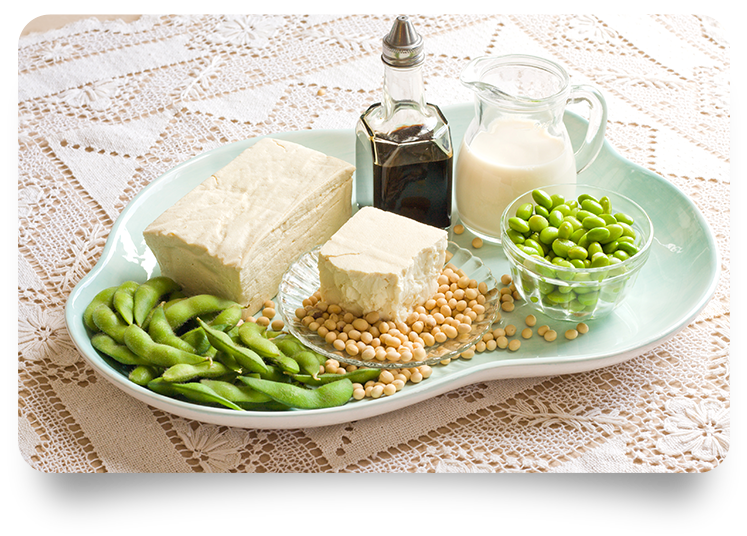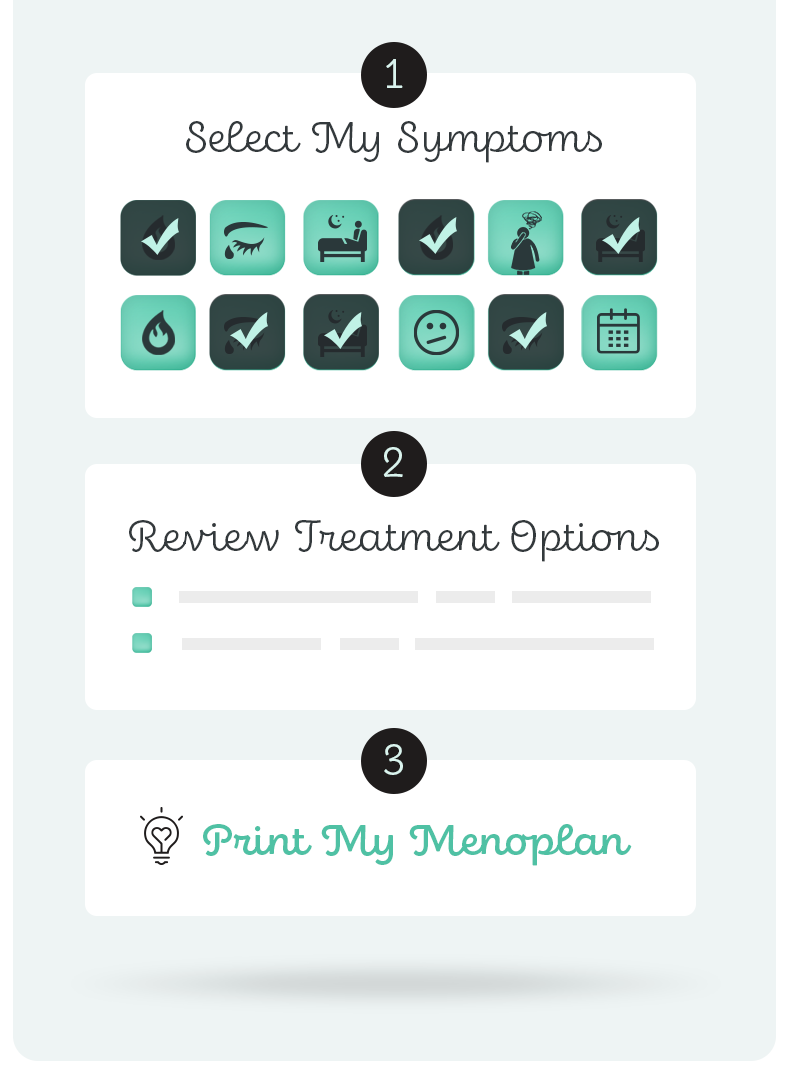Treatments
WHAT IS IT?
Many menopausal age women try soy foods, supplements, and soy powders, to treat their hot flashes. Soybeans, which grow on a bush, are grown around the world. Soy-based foods include soy sauce, tofu, soy milk, soy yogurt, edamame (whole soybeans), miso, and tempeh. Soy lattes are found in coffee shops. Soy foods are an excellent source of protein.
There has been an interest in soy foods and supplements for menopause because soy contains three phytoestrogens. Phytoestrogen means plant-based estrogen. The phytoestrogens in soy are called “isoflavones” – they have a chemical structure similar to estrogen. The soy isoflavones of greatest interest are genistein and daidzein. Because of their chemical structure, it has been thought that soy foods or supplements with phytoestrogens might relieve hot flashes.
In the gut, bacteria can change daidzein is into a chemical called equol. Equol seems to act like a weak estrogen – but only about 20% of U.S. women can make equol. Soy equol is taken as a supplement.
OUR BOTTOM LINE: DOES IT HELP?
MAYBE. The evidence for soy isoflavones is weak, but they are not harmful. If soy interests you, it is safe to try it and see if your hot flashes improve. Equol supplements may also help relieve daytime hot flashes. Soy may help with memory issues, as well.

HOT FLASHES
Dozens of studies have looked at the effects of soy foods, supplements, and powders on menopause symptoms. The daily “dose” of isoflavones used in these studies has ranged from 30-200 mg/day, with most using 50-60 mg/day. The study results are very mixed. Overall, they suggest that soy may slightly relieve hot flashes. Soy isoflavones may reduce hot flashes by about 1.3 hot flashes a day. Soy isoflavones do not seem to relieve night sweats and are not recommended for this symptom. The few studies of equol suggest that when taken twice a day and at high enough doses it helps decrease the number and severity of daytime hot flashes. Equol supplements may help with night sweats.

COGNITIVE ISSUES: MEMORY
Soy isoflavines have been found to slightly improve memory in postmenopausal women. More studies are needed in women in perimenopause. Soy was not helpful for other aspects of cognition, such as attention and executive function.
POTENTIAL RISKS & SIDE EFFECTS
Some women report side effects such as upset stomach, bloating, constipation, or nausea.
Soy isoflavones do not harm the uterus, vagina, or breasts, even when taken for up to two years. Excellent studies have found that soy isoflavones are safe for women with breast cancer.
QUALITY OF LIFE EXPECTATIONS
None
IF I WANT TO TRY THIS TREATMENT WHAT ARE MY NEXT STEPS?
SOY
Start with 50-75 mg/day isoflavones (usually 2 serving of soyfoods or 2 pills a day).
If you think you are being helped, continue, with monitoring for side effects. Use soy isoflavones for 12 weeks to see if your hot flashes improve. Stop if you have bothersome side effects. If soy hasn’t helped you in 12 weeks, try something else.
One serving of a traditional soy food, such as 3-4 oz of tofu or 8 oz of soymilk provides about 25 mg of isoflavones. Soy isoflavone supplements are available and most contain about 25 mg. of isoflavones per pill (about the same as one serving of soy food). There are also soy powders that can be mixed with milk or other liquids (think smoothies).
It is always best to get nutrients from real food. But for those used to a western diet, it is hard to get enough isoflavones from food. Try a serving a day of soymilk or tofu to start. Figure out the mix of food and supplements that works for you. Read labels and take enough pills, powers, and soy foods to reach your 50-75 mg per day goal.
EQUOL
If you want to try equol supplements the best results have been found at daily doses of 100-200mg per day, split into two doses.
The evidence on the effects of soy as a treatment for menopause-related hot flashes has been mixed, with modest effects on average. Most studies tested isoflavone pills, but the dosing varied widely, from 30 mg/day up to 200 mg / day. Some studies have examined the impact of dietary soy. Some recent individual studies suggest that perhaps higher doses (100mg/day) of isoflavones are needed to show improvement in hot flashes (J Clin Diagn Res. 2017 ) ,or that treatment longer than 14 weeks are needed to maximize benefits (Br J Clin Pharmacol. 2015).
There have been three major reviews and meta-analyses since 2011 examining soy as a treatment for hot flashes associated with menopause. In 2011, the North American Menopause Association reported that the majority (11 of 14) of the studies in their review show that soy significantly reduced hot flash frequency. The report concluded that a dose a dose of 50 to 60 mg/day over 12 weeks was sufficient to reducing hot flash frequency and severity.
Subsequently, a Cochrane review from 2013 including 43 studies reported there that evidence is conflicting whether use of soy foods or soy supplements reduces the frequency or severity of hot flushes and night sweats. This report acknowledged that many of the trials included in the review were of poor quality. A review and meta-analysis of 21 randomized controlled trials published in 2016 in the Journal of the American Medical Association including concluded that the use of dietary and soy supplements caused a modest reduction in daily hot flashes, but not night sweats. Many of the studies included in this review were considered of poor quality, and symptom alleviation was stronger for studies that were classified with high risk of bias (JAMA 2016).
Soy was once thought to be contraindicated for women with breast cancer. Because it has weak estrogenic properties, clinicians worried that soy foods might cause estrogen sensitive tumors to grow. However, a landmark study in 2009 published in the Journal of the American Medical Association (Shu, Jama 2009) demonstrated for the first time that soy foods were safe for women with breast cancer. In addition, eating soy decreased risk of death from and recurrence of breast cancer. This was true for women who had either estrogen receptor positive and estrogen receptor negative breast tumors. These same results were later confirmed by several more studies. The 2010 Nutrition, Physical Activity and Cancer Survivorship Advisory Committee issued nutrition and physical activity guidelines for cancer survivors and stated, “For the breast cancer survivor, current evidence suggests no adverse effects on recurrence or survival from consuming soy and soy foods, and there is the potential for these foods to exert a positive synergistic effect with tamoxifen”.
The literature on equol (or S-equol) is promising but limited.
Aso T, Uchiyama S, Matsumura Y, Taguchi M, Nozaki M, Takamatsu K, Ishizuka B, Kubota T, Mizunuma H, Ohta H. A natural S-equol supplement alleviates hot flushes and other menopausal symptoms in equol nonproducing postmenopausal Japanese women. J Womens Health (Larchmt). 2012;21(1):92-100. doi:10.1089/jwh.2011.2753. PMID: 21992596
Crawford SL, Jackson EA, Churchill L, Lampe JW, Leung K, Ockene JK. Impact of dose, frequency of administration, and equol production on efficacy of isoflavones for menopausal hot flashes: a pilot randomized trial. Menopause. 2013;20(9):936-945. doi:10.1097/GME.0b013e3182829413. PMID: 23511704
Franco OH, Chowdhury R, Troup J, Voortman T, Kunutsor S, Kavousi M, Oliver-Williams C, Muka T. Use of Plant-Based Therapies and Menopausal Symptoms: A Systematic Review and Meta-analysis. JAMA. 2016;315(23):2554-2563. doi:10.1001/jama.2016.8012. PMID: 27327802
Guha N, Kwan ML, Quesenberry CP Jr, Weltzien EK, Castillo AL, Caan BJ. Soy isoflavones and risk of cancer recurrence in a cohort of breast cancer survivors: the Life After Cancer Epidemiology study. Breast Cancer Res Treat. 2009;118(2):395-405. doi:10.1007/s10549-009-0321-5. PMID: 19221874
Ishiwata N, Melby MK, Mizuno S, Watanabe S. New equol supplement for relieving menopausal symptoms: randomized, placebo-controlled trial of Japanese women. Menopause. 2009;16(1):141-148. doi:10.1097/gme.0b013e31818379fa. PMID: 19131846
Jenks BH, Iwashita S, Nakagawa Y, Ragland K, Lee J, Carson WH, Ueno T, Uchiyama S. A pilot study on the effects of S-equol compared to soy isoflavones on menopausal hot flash frequency. J Womens Health (Larchmt). 2012;21(6):674-682. doi:10.1089/jwh.2011.3153. PMID: 22409590
Lampe JW. Is equol the key to the efficacy of soy foods? Am J Clin Nutr. 2009;89(5):1664S-1667S. doi:10.3945/ajcn.2009.26736T. PMID: 19357217
Lethaby A, Marjoribanks J, Kronenberg F, Roberts H, Eden J, Brown J. Phytoestrogens for menopausal vasomotor symptoms. Cochrane Database Syst Rev. 2013;(12):CD001395. Published 2013 Dec 10. doi:10.1002/14651858.CD001395.pub4. PMID: 24323914
Li L, Lv Y, Xu L, Zheng Q. Quantitative efficacy of soy isoflavones on menopausal hot flashes. Br J Clin Pharmacol. 2015;79(4):593-604. doi:10.1111/bcp.12533. PMID: 25316502
Newton KM, Reed SD, LaCroix AZ Grothaus MS, Ehrlich KE, Guiltinan J. Treatment of vasomotor symptoms of menopause with black cohosh, multibotanicals, soy, hormone therapy, or placebo: a randomized trial. Ann Intern Med. 2006;145(12):869-879. doi:10.7326/0003-4819-145-12-200612190-00003. PMID: 17179056
North American Menopause Society. The role of soy isoflavones in menopausal health: report of The North American Menopause Society/Wulf H. Utian Translational Science Symposium in Chicago, IL (October 2010). Menopause. 2011;18(7):732-753. doi:10.1097/gme.0b013e31821fc8e0. PMID: 21685820
Rock CL, Doyle C, Demark-Wahnefried W, Meyerhardt J, Courneya KS, Schwartz AL, Bandera EV, Hamilton KK, Grant B, McCullough M, Byers T, Gansler T. Nutrition and physical activity guidelines for cancer survivors[published correction appears in CA Cancer J Clin. 2013 May;63(3):215]. CA Cancer J Clin. 2012;62(4):243-274. doi:10.3322/caac.21142. PMID: 22539238.
Utian WH, Jones M, Setchell KD. S-equol: A Potential Nonhormonal Agent for Menopause-Related Symptom Relief. J Womens Health (Larchmt). 2015;24(3):200-208. doi:10.1089/jwh.2014.5006. PMID: 25692726
Xiao Ou Shu, MD, Ph.D. Ying Zheng, MD, M.Sc, Hui Cai, MD, Ph.D, Kai Gu, MD, Zhi Chen, MD, Ph.D, Wei Zheng, MD, Ph.D, and Wei Lu, MD, Ph.D. Soy Food Intake and Breast Cancer Survival. JAMA. 2009 Dec 9; 302(22): 2437–2443. doi:10.1001/jama.2009.1783
Authors: Dr. Bette Caan, Dr. Katherine Newton, & Dr. Leslie Snyder. Last reviewed February 15, 2021



